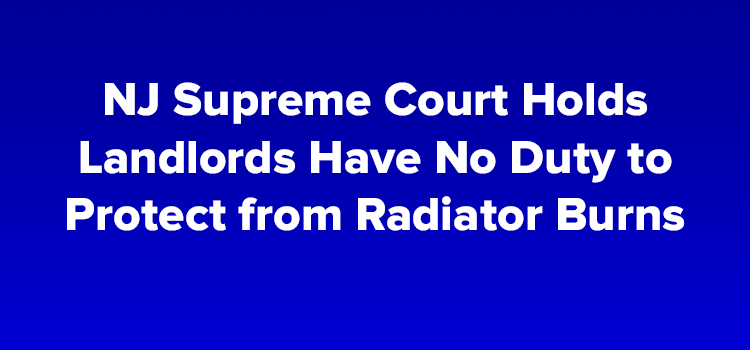In J.H. v. R&M Tagliareni, LLC, (A-6-18/081128) (Decided July 31, 2019), the Supreme Court of New Jersey held that landlords do not have a duty to cover radiators in their apartment buildings. The case arose from the injuries to a nine-month old child, who was severely burned when he came into contact with a radiator in his apartment.

Facts of J.H. v. R&M Tagliareni, LLC
On March 30, 2010, a nine-month-old infant, J.H., suffered permanent scarring when he was burned by an uncovered, free-standing cast iron loop radiator in an apartment owned and managed by defendants R&M Tagliareni, LLC, and Robert & Maria Tagliareni, II, LLC. J.H.’s father placed J.H. in a twin bed to sleep with his ten- year-old stepsister. The bed did not have rails and was adjacent to a steam-heated radiator that did not have a cover. The next morning, J.H. was discovered lying on the floor with his head pressed against the hot radiator.
J.H. and his guardian ad litem filed suit, alleging defendants’ negligence was the cause of J.H.’s injuries. At his deposition, Robert Tagliareni testified that none of his tenants at the property were ever burned by coming into contact with a radiator, and none ever asked for a radiator cover or complained about not having one. Myles Pryor, an inspector for the Bureau of Housing Inspection, inspected defendants’ apartment building and its individual units in 2010. Pryor testified that he has seen radiators that do not have any sort of radiator cover on them and that he would not issue a violation to a property owner for not having covers on radiators. Based on his training as a housing inspector, Pryor testified that it is his understanding that there is no requirement under the Hotel and Multiple Dwelling Law that radiators be covered.
The trial court held that the defendants did not owe a common law duty of care to place a cover on the apartment’s radiator and were not required by a regulation that governs “heating systems” (N.J.A.C. 5:10-14.3(d)) to cover the radiator with insulating material. The statute provides: “The heating system, including such parts as heating risers, ducts and hot water lines, shall be covered with an insulating material or guard to protect occupants and other persons on the premises from receiving burns due to chance contact.”
The Appellate Division reversed, concluding that, under the common law, defendants maintained sufficient control over the heat emanating from the radiator such that a duty of care was owed to J.H. Regarding the regulatory issue, the Appellate Division concluded that plaintiffs should be allowed to argue at trial that N.J.A.C. 5:10-14.3(d) imposed a duty of care upon defendants, and that the duty was breached.
Majority Decision in J.H. v. R&M Tagliareni, LLC
The Supreme Court of New Jersey reversed. [According to the majority, it was “unpersuaded that N.J.A.C. 5:10-14.3(d) imposes any regulatory duty on landlords to cover in-unit radiators with insulating material or a cover.” As Justice Faustino Fernandez-Vina explained:
The regulatory scheme provides no evidence of an express or implied intent to include radiators as part of the “heating system” required to be insulated. Having concluded that no such regulatory duty has been imposed, and because the tenants in this case maintained exclusive control over the heat emanating from the radiator, we decline to impose on landlords a new common law duty to cover all in-unit radiators.
In reaching its decision, the majority concluded that in-unit radiators are not covered by N.J.A.C. 5:10-14.3(d). “Although ‘heating system’ is not otherwise detailed, the list of what it includes — besides the unstated but obvious heating source itself — mentions only heating risers, ducts, and hot water lines. The items listed are all of a kind — they are beyond the control of the end user and are in the exclusive control of the landlord,” Justice Fernandez-Vina wrote. “Had the DCA determined that radiators required covering, the agency possessed the knowledge and expertise to include them in N.J.A.C. 5:10-14.3(d), and could have easily done so.”
The court went on to also reject the plaintiffs’ common-law claim, emphasizing that a landlord has a duty to exercise reasonable care to guard against foreseeable dangers arising from use of those portions of the rental property over which the landlord retains control. “Absent control over property or equipment, it violates a sense of fairness to hold a landlord liable for harm caused by an item in the tenant’s control,” Justice Fernandez-Vina wrote.
Dissent in J.H. v. R&M Tagliareni, LLC
Chief Justice Stuart Rabner authored a dissent, which was joined by Justice Barry T. Albin. “Landlords have a duty to use reasonable care to guard against foreseeable hazards to tenants that arise from areas within the landlord’s control,” Chief Justice Rabner wrote.
“Based on those principles, landlords should have a duty to take reasonable steps to prevent the serious harm that scalding hot radiators can cause,” Rabner added. “A simple radiator cover, available at most home improvement stores for a modest cost, can prevent the foreseeable risk that countless apartment dwellers face. It can spare a child from being scalded and scarred.”
